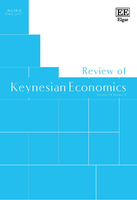
Review of Keynesian Economics
Scope & Guideline
Fostering Critical Analysis in Economic Paradigms
Introduction
Aims and Scopes
- Keynesian Economic Theory:
The journal serves as a platform for exploring foundational and contemporary aspects of Keynesian economics, including its principles and critiques, while promoting a revival of Keynesian thought in modern economic discourse. - Monetary Policy and Financial Regulation:
A significant focus is placed on the analysis of monetary policy frameworks and financial regulation, particularly in light of contemporary challenges such as financial crises, inflation dynamics, and the evolving role of central banks. - Macroeconomic Stability and Growth:
Research on macroeconomic stability, growth models, and the impacts of demand and supply-side factors is prevalent, emphasizing the importance of effective demand in driving economic outcomes. - Development Economics and Structuralism:
The journal explores issues related to development economics, particularly in peripheral and emerging economies, drawing on structuralist perspectives to analyze economic performance and policy implications. - Heterodox Economic Approaches:
The Review champions heterodox approaches, including Post-Keynesian, Marxian, and institutional economics, fostering interdisciplinary dialogues that enrich the understanding of economic phenomena.
Trending and Emerging
- Inflation Dynamics and Monetary Policy:
Recent publications have increasingly explored the complexities of inflation dynamics and the effectiveness of monetary policy in varying economic contexts, especially in the aftermath of the COVID-19 pandemic. - Financialization and its Impacts:
There is a growing emphasis on financialization and its implications for economic stability, income distribution, and growth, reflecting a critical examination of the financial sector's role in the economy. - Non-Bank Financial Intermediation:
Emerging discussions around non-bank financial intermediation highlight its relevance in modern finance, particularly in relation to liquidity risks and regulatory challenges. - The Role of Digital Currencies and Fintech:
With the rise of digital currencies and financial technologies, the journal is increasingly addressing their implications for monetary policy, regulatory frameworks, and economic behavior. - Hysteresis and Path Dependence:
The concepts of hysteresis and path dependence are gaining attention as researchers investigate their effects on economic recovery and long-term growth trajectories, particularly in the context of post-crisis economies.
Declining or Waning
- Traditional Neoclassical Models:
There has been a noticeable decline in the focus on traditional neoclassical economic models and their assumptions, as the journal increasingly emphasizes alternative frameworks that challenge these paradigms. - Static Economic Analyses:
Static analyses that fail to account for dynamic factors such as time, expectations, and institutional change are becoming less frequent, reflecting a shift towards more complex, dynamic modeling approaches. - Globalization as a Panacea:
The once-revered notion of globalization as a universal solution for economic advancement is waning, as papers increasingly critique its impacts on inequality and economic sovereignty, particularly in developing contexts. - Single-Country Focus:
Research focusing solely on single-country case studies appears to be declining, with a growing preference for comparative analyses that incorporate regional and global perspectives. - Overreliance on Quantitative Methods:
The journal has shown a reduction in papers relying heavily on quantitative methods without qualitative insights, indicating a shift towards more integrative methodologies that encompass both qualitative and quantitative analyses.
Similar Journals

POLITICKA EKONOMIE
Cultivating Knowledge for Informed Societal ChangePOLITICKA EKONOMIE is a prominent academic journal published by VYSOKA SKOLA EKONOMICKA in the Czech Republic, focusing on the intersection of economics, sociology, and political science. Established to foster critical discourse within these fields, the journal's ISSN is 0032-3233, and it operates with an E-ISSN of 2336-8225. With a convergence history dating back to 1980, POLITICKA EKONOMIE has become a valuable resource for researchers and practitioners seeking insights into societal and economic dynamics. Although the journal is categorized in Quartile 4 for both Economics and Econometrics and Sociology and Political Science categories as of 2023, it continues to contribute significantly to empirical research and theoretical advancements. Researchers will find that while the journal is not open access, it welcomes submissions that engage with contemporary issues and debates, thereby promoting academic exchange and innovation in the social sciences.
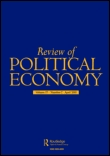
REVIEW OF POLITICAL ECONOMY
Exploring the Nexus of Politics and EconomicsThe Review of Political Economy, published by Taylor & Francis Ltd, stands as a premier journal in the fields of Political Science and Economics, with an impressive 2023 Q1 ranking in both categories. With an ISSN of 0953-8259 and an E-ISSN of 1465-3982, the journal offers a dynamic platform for rigorous scholarly debate and critical analysis since its inception in 1989. Located in the United Kingdom, the journal focuses on current political economic issues, engaging researchers, professionals, and students alike. Its ability to converge disciplines has made it a vital source of insights for those navigating the complex intersections of politics and economics, firmly establishing its relevance in contemporary academic discourse. Although not an open access journal, its contributions to the field are invaluable, underlined by robust Scopus rankings that reflect its influence and quality. By connecting theory with practice, the Review of Political Economy continues to inspire and inform critical discourse within the global academic community.
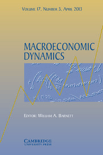
MACROECONOMIC DYNAMICS
Elevating Understanding of Economic Trends and ImpactsMACROECONOMIC DYNAMICS, a distinguished academic journal published by Cambridge University Press, serves as a pivotal platform for innovative research in the fields of economics and econometrics. With its ISSN 1365-1005 and E-ISSN 1469-8056, the journal has been at the forefront of scholarly communication since its inception in 1997, offering an extensive range of articles that explore dynamic economic models, policy impacts, and theoretical advancements through the latest empirical analyses. Currently holding a Q2 ranking within the 2023 Economics and Econometrics category, and positioned at rank #409 out of 716 within Scopus, it is an essential resource for researchers, professionals, and students alike, looking to stay updated on critical developments in macroeconomic theory and practice. Although it follows a traditional subscription model rather than Open Access, the journal continually strives to disseminate high-quality, peer-reviewed content that informs and inspires the global economics community. The importance of MACROECONOMIC DYNAMICS lies in its commitment to fostering a deeper understanding of economic phenomena, making it a must-read for anyone engaged in the complexities of the economic landscape.
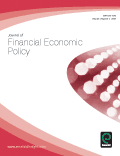
Journal of Financial Economic Policy
Bridging theory and practice in financial economic research.Journal of Financial Economic Policy is a premier academic journal published by EMERALD GROUP PUBLISHING LTD, focusing on the intersection of finance and economics. Through rigorous peer-reviewed research, the journal aims to advance understanding of financial policies and economic frameworks, addressing critical issues faced by financial markets and institutions. With an ISSN of 1757-6385 and an E-ISSN of 1757-6393, it serves as a reputable source of information for researchers, professionals, and students alike. The journal operates within the United Kingdom and is recognized for its contributions to the fields of economics and finance, achieving a Q3 category ranking in both disciplines as per the 2023 metrics. This places it within the top half of journals in its category according to Scopus ranks, demonstrating a solid impact in the academic community. Although it is not an open-access journal, the insights and analyses published are invaluable for those seeking to grasp complex financial phenomena and develop effective policies. The journal’s scope encompasses a wide range of topics relevant to contemporary finance and economic strategies, making it an essential resource for ongoing scholarly discourse and practical applications.

JOURNAL OF POST KEYNESIAN ECONOMICS
Redefining Economic Discourse with Post-Keynesian Insights.The JOURNAL OF POST KEYNESIAN ECONOMICS, published by ROUTLEDGE JOURNALS, TAYLOR & FRANCIS LTD, stands as a pivotal platform in the field of economics, focusing on the post-Keynesian school of thought. Established in 1985, this journal provides a vital forum for the dissemination of innovative research that challenges conventional economic theories and promotes a deeper understanding of economic phenomena through alternative perspectives. With an impressive impact factor positioned within the Q3 category of Economics and Econometrics, and a Scopus ranking of #454 out of 716 in its field, the journal maintains its commitment to high-quality scholarship. Researchers, professionals, and students will benefit from its comprehensively curated articles addressing contemporary economic issues and theoretical advancements, making it an essential resource for anyone interested in the evolution and application of post-Keynesian economics. While access is not open, interested readers can explore issues and articles through institutional libraries or purchase individual subscriptions.
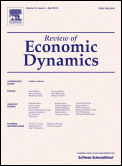
REVIEW OF ECONOMIC DYNAMICS
Illuminating the Path of Economic DynamicsREVIEW OF ECONOMIC DYNAMICS, published by Academic Press Inc, Elsevier Science, is a leading academic journal in the field of economics and econometrics, holding a distinguished Q1 ranking in its category as of 2023. With an impactful focus on the theoretical and empirical analysis of dynamic economic systems, the journal seeks to advance our understanding of economic dynamics through innovative research that addresses contemporary issues and policy implications. The journal boasts a significant history of contributions from renowned scholars since its inception in 1998, and will continue to publish through 2025. Although it does not currently offer open access options, the journal serves as a crucial resource for researchers, professionals, and students who are keen to explore and engage with the latest findings in economic theory and practice. With a current Scopus rank of #280 out of 716 in the Economics and Econometrics category, the REVIEW OF ECONOMIC DYNAMICS remains an invaluable platform for scholarly discussion and insight into the complexities of economic behavior.

JOURNAL OF FINANCIAL ECONOMICS
Transforming theoretical frameworks into practical solutions.Welcome to the JOURNAL OF FINANCIAL ECONOMICS, a premier publication in the realms of finance, economics, and accounting, published by Elsevier Science SA in the Netherlands. With its impactful contributions since 1974, this esteemed journal has earned an impressive impact factor and consistently ranks in the Q1 category across various fields, including Accounting, Economics and Econometrics, Finance, and Strategy and Management. Researchers can access cutting-edge studies that delve into both theoretical frameworks and empirical analyses, crucial for advancing financial literacy and economic policies globally. With remarkable Scopus rankings, notably placing #2 in Accounting and #6 in Finance, the journal serves not only as a reliable resource for academics but also as a vital tool for professionals seeking to stay abreast of the latest financial trends and insights. Engage with the latest research and contribute to the dialogue shaping the future of financial economics!

PSL Quarterly Review
Exploring the Frontiers of Economic and Legal StudiesPSL Quarterly Review, published by ASSOC PAOLO SYLOS LABINI, is a distinguished open-access journal based in Italy, dedicated to fostering discourse in multifaceted fields such as Business, Management, and Accounting, as well as Economics and Law. Since its inception in 2009, the journal has carved a niche in academia, providing a platform for innovative research and critical thought. With an impactful presence reflected in its 2023 Scopus ranks, including Q3 classifications in Business, Management, Accounting, and Economics, alongside a Q2 classification in Law, the PSL Quarterly Review serves as a vital resource for scholars and practitioners alike. The journal aims to bridge the gap between theoretical frameworks and practical applications, thus enriching the repertoire of contemporary economic and legal studies. Its broad accessibility and commitment to quality scholarship ensure that it remains a pivotal publication for those engaged in advancing knowledge across relevant disciplines.
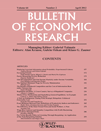
BULLETIN OF ECONOMIC RESEARCH
Exploring the Frontiers of Economic InsightBULLETIN OF ECONOMIC RESEARCH is a premier academic journal published by WILEY, dedicated to the dissemination of high-quality research in the field of economics and econometrics. Established in 1948, the journal has a rich history of contributing to the scholarly dialogue surrounding economic theory and practice, making it an essential resource for researchers, professionals, and students alike. With an impressive impact factor and ranked in the Q3 category for 2023, the journal publishes original research articles, reviews, and theoretical discussions that reflect current trends and developments in the field. Despite not being an open-access journal, it offers numerous access options through institutional subscriptions, ensuring wide dissemination of its impactful content. Aiming to foster a deeper understanding of economic issues, the BULLETIN OF ECONOMIC RESEARCH serves as a vital platform for ongoing scholarly debate and innovation in economic thought.
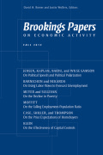
BROOKINGS PAPERS ON ECONOMIC ACTIVITY
Innovating Economic Research for a Better Tomorrow.BROOKINGS PAPERS ON ECONOMIC ACTIVITY, published by Johns Hopkins University Press, stands at the forefront of economic research, providing critical insights and analysis across the fields of economics and econometrics. With a prestigious Q1 ranking in both the Business, Management and Accounting (miscellaneous) and Economics and Econometrics categories for 2023, this journal is renowned for its scholarly contributions that shape public policy and debates within the economic community. Since its inception, the journal has consistently published high-impact research and innovative discussions surrounding economic activity, making it an essential resource for researchers, professionals, and students alike. Although it does not offer open access, its academic rigor and relevance continue to attract a broad readership, contributing to a deeper understanding of economic phenomena in the United States and beyond. For more information, visit the journal’s homepage or the Johns Hopkins University Press website.